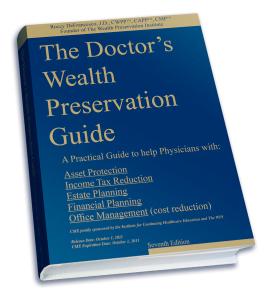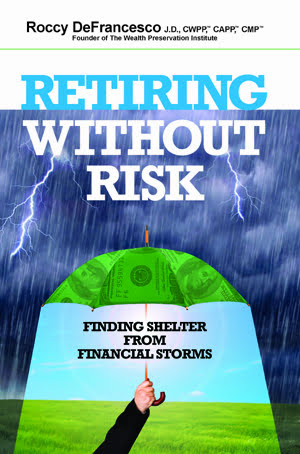Bad Advisors
- Home
- Bad Advisors
Bad Advisors

One of the biggest problems in the financial services/insurance industries is the number of “bad advisors.”
What is a bad advisor? Our definitions will come from the Bad Advisors book written by Roccy DeFrancesco, JD. To receive a free complimentary copy of this book, please contact our office at info@wealthpreservationproducts.com. To hear specifically from author DeFrancesco what makes a bad advisor, please scroll down to the bottom of the page and watch his brief educational video.
— Bad Financial Planner
A financial planner can be considered a bad advisor for a number of different reasons (a few listed below):
1) The advisor might work with a Broker Dealer (BD) who ties their hands and restricts the types of investments or products that can be offered to clients. Unfortunately, this is more the rule than the exception with financial planners. Many restricted advisors are not able to offer items like Retirement Life™ or certain guaranteed return (accumulation value)/guaranteed income for life products.
2) The only thing worse than having a BD restrict what an advisor can offer his/her clients is to not disclose this fact to the clients themselves. Lack of disclosure is a significant problem in the industry today. If you could purchase a product that had a 7% guaranteed rate of return on an accumulation value coupled with a guaranteed income for life, don’t you think a financial planner should disclose the fact that he/she is forbidden by his/her BD from offering it to all current and future clients? We think it should be disclosed and any advisor who doesn’t disclose his/her limitations is someone we would consider a bad advisor.
3) Most financial planners don’t know many of the concepts/products they need to know in order to give comprehensive advice. Just ask your current planner (or someone you are interviewing if they know the following topics: corporate structure, Captive Insurance Companies, FLPs, “Freeze” Partnerships, Retirement Life (a tax free wealth building tool), Roth IRA and 401(k) Plans, Section 79 Plans, Equity Harvesting, 401(k) Plans, New Comparability Profit Sharing Plans, Defined Benefit Plans, 412(e)3 Defined Benefit Plans (and carve out plans), 401(h) Plans, Cash Balance Plans, ESOPs, Charitable Remainder Trusts, Charitable Gift Annuities, Family Foundations, Intentionally Defective Grantor Trusts, Long-Term Care Insurance, HSAs, Corporate Structure, Single Premium Life Insurance (with LTC rider), Roth IRA Conversions, etc.
The bottom line with financial planners is that they need to know the important concepts/products in the market and be able to offer them to you without restriction.
— Bad insurance agent
This website could go on for pages and pages about what makes a bad insurance agent. Having said that, the list is somewhat similar to what makes a bad financial planner.
1) Many agents are somewhat or are very restricted in the products they offer.
There are what we call “contractually captive” agents like State Farm agents who can only sell State Farm products. That means that if such an agent tries to sell you an annuity or life insurance policy, it is a State Farm product (and these are not products we would recommend if we had the ability to). Additionally, companies like State Farm don’t even offer products like the ones we talk about on this website (Retirement Life™ and the guaranteed return/income for life products).
There are what we call “mentally captive” agents who even though they are “independent” they act like the are captive because they sell the same life and annuity products over and over to their clients even if objectively speaking there are better products to fulfill the client’s needs. There are many reasons that mentally captive agents act the way they do and you can learn about them by reading the book Bad Advisors.
2) Like financial planners, lack of disclosure is also a problem with insurance agents. Most do not disclose the restrictions they have when it comes to offering certain products.
3) Like financial planners, most insurance agents don’t know the needed topics to provide “comprehensive” advice to their clients (see 3) above for a partial list that insurance agents should be familiar with).
Summary
Unfortunately, the majority of advisors in the insurance and financial services fields are what author DeFrancesco would define as bad advisors.
At our firm we pride ourselves in knowing what we need to know and being able to offer the best products and services in the industry to the best and most comprehensive advice can be given to our clients. For more information about the services we are able to provide to our clients, please e-mail info@wealthpreservationproducts.com.






